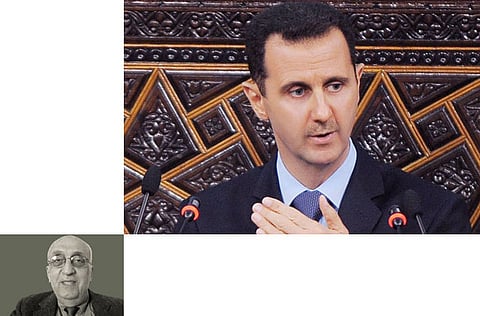Al Assad needs foreign media
Claims made by Syrian diplomats carry no weight in the absence of unbiased reporting on the ground

There is no doubt that Middle East watchers must be befuddled about what is going on in Syria, a key Arab state that is by any calculation at present at the epicentre of the Arab world.
Unlike in Egypt and Tunisia, where the Arab Spring overthrew autocratic regimes in a few weeks, the like-minded regimes in Syria, Yemen and Libya are still engrossed in a long and bloody battle for survival.
Any change in Syria, one way or the other, is bound to seriously affect its key next-door neighbours: Iraq, where the country remains in turmoil despite the devastating American intervention; Jordan, where the monarchy has taken initial steps to accommodate popular demands; Israel, where the people are said to be very anxious about the Arab awakening next door; Lebanon, where a significant segment of the population is controlled by an admired Syrian ally, Hezbollah; and Turkey, now home to more than 10,000 Syrian refugees and a one-time ally turned critic of the Bashar Al Assad regime.
Another regional power and Syria's key ally is Iran whose leadership has regional ambitions, much to the chagrin of Israel which enjoys strong American backing, and influential oil-rich Arab states.
Despite criticism of the Al Assad regime in the West, western leaders have given him a choice to either reform or step aside, as opposed to the case with the Libyan dictator, Muammar Gaddafi, or even the Yemeni President Ali Abdullah Saleh, who is still recuperating in Saudi Arabia after being attacked by Yemeni rebels.
In other words, all hope that the Syrian president, an ophthalmologist who studied in London after graduating from Damascus University, will sooner rather than later manage to come to terms with leaders of the uprising, now in its fourth month. Otherwise, the entire region could be embroiled in endless turmoil.
In his third address to the nation since the uprising, this one at his alma mater, Al Assad spoke generously and promisingly about political reforms for more than an hour. He acknowledged reforms were much needed.
Top on his list of promises was ending the monopolistic status of his ruling Arab political party, the Arab Baath, once home of a pan-Arab movement that held much promise in yesteryears.
He called for a national dialogue — "a dialogue that will include all fabrics of the Syrian society" — which he said would start soon, and the formation of a committee to study constitutional amendments including one that would allow the formation of other political parties besides his.
But the president did not set a deadline or indicate when his reforms will be introduced. All he said was that he expects a package of reforms by September or the end of the year. Parliamentary elections, scheduled for August, might be postponed if the reform committees decide to delay them.
Dissatisfaction
According to the Associated Press, "the speech's vague timetable and few specifics — and lack of any clear move toward ending the Al Assad family's political domination — left Syrian dissidents deeply dissatisfied."
As expected, Al Assad was categorical in his remarks about the role of "saboteurs" and others "who are distorting the image of the Syrian nation abroad, and wanted to open the gates, and even called for foreign intervention". He further complained that there are some "who are killing in the name of religion and want to spread chaos under the pretext of religion".
What has been deeply disappointing in Al Assad's remarks is the absence of any indication of when the Syrian government would allow foreign journalists, including Arab correspondents, to enter Syria and report on the turmoil in the country of over 20 million people.
Al Assad fails to realise that the presence of foreign newsmen could help rebuild the Syrian government's image. The government can provide these reporters an authenticated version of events in the country rather than have its diplomats brief suspecting reporters overseas. All the Arab countries that faced an uprising this year have to their credit tolerated foreign journalists.
Syrian officials and diplomats have all along deplored the alleged biased reporting in the media. Some particularly criticised the Reuters news agency and the popular Arabic television network Al Jazeera based in Qatar. Most of the media coverage is based on the so-called social media transmitted by amateurs or partisans from inside Syria.
It is going to take more than a magic wand or Syrian diplomats holding background briefings, to downplay the uprising by making claims that the protesters are a small fraction of the over 20 million inhabitants unlike the hundreds of thousands of Egyptians who assembled at Tahrir Square in Cairo before the ouster of president Hosni Mubarak.
George S. Hishmeh is a Washington-based columnist. He can be contacted at ghishmeh@gulfnews.com.



